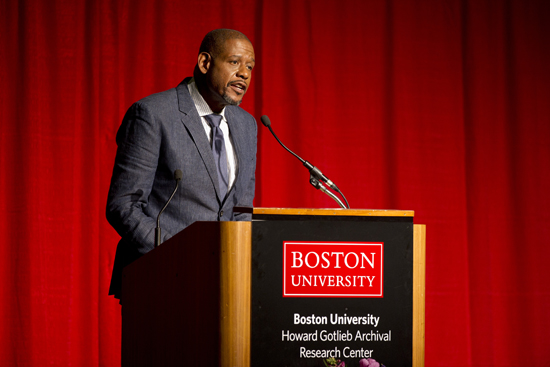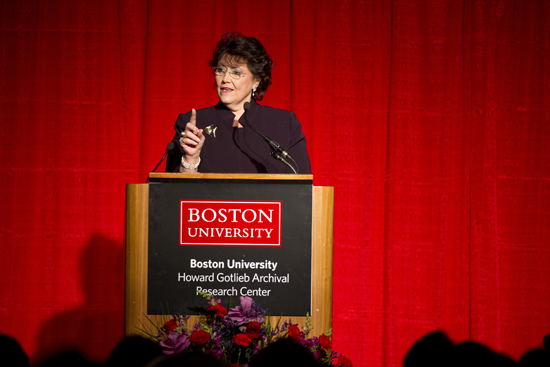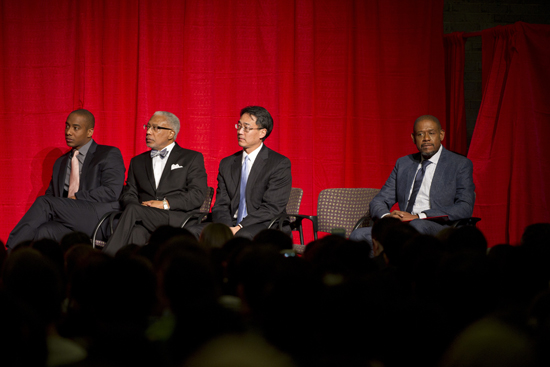Forest Whitaker Honored as BU MLK Fellow
Oscar-winner urges students to “believe in your dreams”

Actor and humanitarian Forest Whitaker was honored as the University’s fourth Martin Luther King, Jr., Fellow on Monday at the GSU’s Metcalf Hall. Photos by Vernon Doucette
Speaking before a crowd of several hundred Monday afternoon, Oscar-winning actor Forest Whitaker delivered the fourth Martin Luther King, Jr., Leadership Lecture, sponsored by the Howard Gotlieb Archival Research Center, on the same day the nation celebrated the 37th anniversary of Martin Luther King, Jr. Day and the inauguration of President Barack Obama to his second term.
The weight of the moment was not lost on the award-winning actor, director, and producer.
“In King’s day, it would have seemed crazy to expect the level of progression that resulted in the election and reelection of Barack Obama, but he too had a dream and worked tirelessly to achieve it,” the soft-spoken Whitaker told the crowd of mostly students at the GSU’s Metcalf Hall. “Stop for a moment. Think about that. What seems impossible, versus what is impossible.”
Like Obama, Whitaker said he dared to dream because of the example set by King (GRS’55, Hon.’59). Best known for his Academy award-winning turn as Ugandan dictator Idi Amin in the 2006 film The Last King of Scotland, the actor has also produced several films that have brought attention to otherwise neglected topics, like child soldiers and genocide in Africa and the life of inner-city youth in the United States. He has increasingly dedicated much of his energy to social activism and humanitarian work, founding the PeaceEarth Foundation, cofounding and chairing the International Institute for Peace, and serving as a UNESCO Goodwill Ambassador for Peace and Reconciliation.

Vita Paladino (MET’79, SSW’93), director of the Gotlieb Center, which houses Whitaker’s archives, was one of several BU representatives introducing the actor, who was invested during the event as a Martin Luther King, Jr., Fellow. Walter Fluker (GRS’88), the Martin Luther King, Jr., Professor of Ethical Leadership at the School of Theology, Willis Wang, a University vice president and associate provost for global programs, and Hampton Fluker (CFA’13) also introduced him.
“Mr. Whitaker, you are an excellent role model for our students and for all of us at the University,” Paladino said. “You have influenced many by your creative work, with the dignity and integrity you bring to it.”
In delivering the Martin Luther King, Jr., Leadership Lecture, Whitaker joined an elite group of past fellows: Christine King Farris, MLK’s sister, Paul Rusesabagina, the real-life hero whose story inspired the film Hotel Rwanda, and civil rights leader John Lewis, a U.S. congressman from Georgia.
In his nearly hour-long talk, Whitaker quoted King and Obama often as he addressed such issues as peace, forgiveness, and reconciliation.
As a kid growing up in South Central Los Angeles in the ’60s, Whitaker said, he dreamt of becoming an actor, but there were few black role models in film and even fewer in a neighborhood where gang violence flourished. It was because of gang conflict that his family moved across town so he could enroll in a different junior high—one he had to travel two hours each way to attend. He went on to California State University on a football scholarship, but his athletic career was cut short by an injury. After transferring to the University of Southern California, he returned to his original dream after discovering opera, and later, theater and film.
“Acting is a way for me to connect with the human spirit, pursue it as I want to, to connect with the light that I believe exists in each and every one of us,” he said. “I always try to connect with that source, that core, connect with that internal flame, that eternal flame, that I believe connects all of us.”

One of Hollywood’s most prominent African Americans, Whitaker also spoke about the prejudices that continue in American society. He described his own experience of being pulled over by police, harassed, and arrested for disorderly conduct when his only crime was a broken taillight. Drawing on his humanitarian work, he also spoke about the continuing torture and maiming of people because of their race or religious beliefs. “There’s still hate and disparity in the world,” he said, “but what matters more is rising to overcome it.”
Peace-building, he reminded his audience, “is a continuous job, one we must not take for granted.”
Whitaker credited King and Obama for their use of nonviolent means to resolve conflict, and he encouraged the current generation of students to do the same, urging them to embrace the power of forgiveness and to harness the type of revolutionary change King spoke of—the kind inspired by love.
He said change comes only to those who have a plan. He advised his listeners to hold firmly to their ideas and to pursue them with the conviction that they would someday become real. That, he noted, was the legacy left by Martin Luther King, Jr., a legacy that continues with the inauguration, twice, of Barack Obama.
“Believe in your dreams,” Whitaker urged. “Pursue them, follow them, activate them.”
Comments & Discussion
Boston University moderates comments to facilitate an informed, substantive, civil conversation. Abusive, profane, self-promotional, misleading, incoherent or off-topic comments will be rejected. Moderators are staffed during regular business hours (EST) and can only accept comments written in English. Statistics or facts must include a citation or a link to the citation.